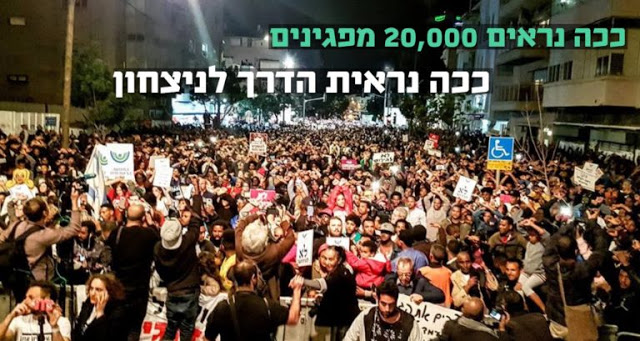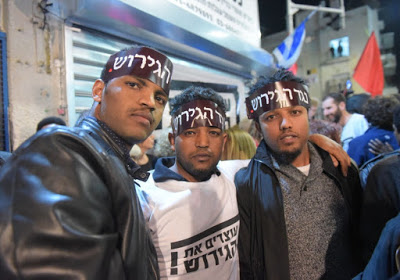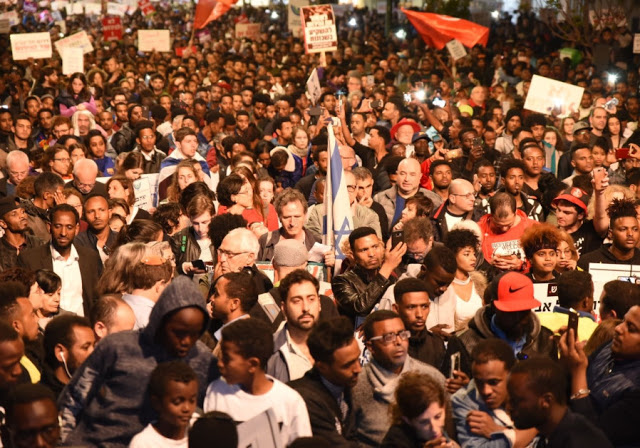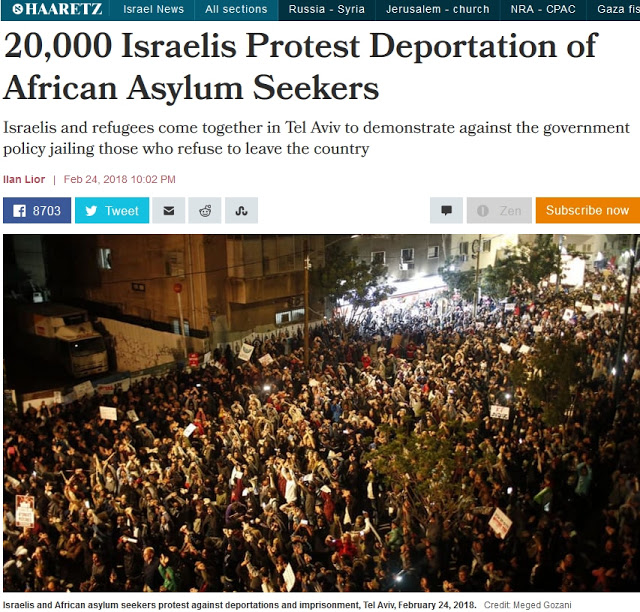In the world’s most racist state, Two out of every Three Israelis Support the Deportation of Black African Refugees
In
what was an impressive demonstration, 20,000 people – refugees and Israelis –
demonstrated on Saturday in Tel Aviv.
The equivalent size in Britain for such a demonstration would be about
200,000.
what was an impressive demonstration, 20,000 people – refugees and Israelis –
demonstrated on Saturday in Tel Aviv.
The equivalent size in Britain for such a demonstration would be about
200,000.
Nonetheless
opinion polls in Israel show that about two in every three Israelis, in what is
the most racist state in the world, support the attempts by Netanyahu and the
government to deport the asylum seekers.
opinion polls in Israel show that about two in every three Israelis, in what is
the most racist state in the world, support the attempts by Netanyahu and the
government to deport the asylum seekers.
To
date just 11 asylum seekers have been granted refugee status. Compare this with some 90% success for
Eritrean refugees in Europe. Israel is
simply refusing to process asylum applications. Last week a court held that those who had escaped from the Eritrean army
were entitled to refugee status.
date just 11 asylum seekers have been granted refugee status. Compare this with some 90% success for
Eritrean refugees in Europe. Israel is
simply refusing to process asylum applications. Last week a court held that those who had escaped from the Eritrean army
were entitled to refugee status.
Meanwhile
Israel has begun to gaol refugees who refuse to accept deportation although it
seems that the Israeli prison service, which is full with Palestinian prisoners,
cannot cope with such a huge influx.
Israel has begun to gaol refugees who refuse to accept deportation although it
seems that the Israeli prison service, which is full with Palestinian prisoners,
cannot cope with such a huge influx.
Below
is an excellent video from Abby Martin on the anti-Black racism in Israel’s Jewish
supremacist state.
is an excellent video from Abby Martin on the anti-Black racism in Israel’s Jewish
supremacist state.
It is surprising that the Jewish Labour Movement and Labour Friends of Israel, who are so concerned about non-existent ‘anti-semitism’ in the Labour Party, have yet to condemn this racist attempt to deport refugees in order to safeguard Israel’s Jewish majority and the support of the Israeli Labour Party for Netanyahu by their ‘sister’ party in Israel.
Tony
Greenstein
Greenstein
Empire Files: Anti-Black
Racism Reveals Israel’s White Supremacy
Racism Reveals Israel’s White Supremacy
see also
Israelis and refugees come together in Tel Aviv to demonstrate
against the government policy jailing those who refuse to leave the country
against the government policy jailing those who refuse to leave the country
Feb 24, 2018
Around 20,000 Israelis gathered alongside African asylum
seekers in Tel Aviv to protest against the Israeli government’s policy of
deportations and imprisonment of the asylum seekers.
seekers in Tel Aviv to protest against the Israeli government’s policy of
deportations and imprisonment of the asylum seekers.
The protest took place in south Tel Aviv, where
most of the city’s asylum seekers live, and local residents have long
complained about their presence there.
most of the city’s asylum seekers live, and local residents have long
complained about their presence there.
Protesters carried signs reading, “No to
deportation,” “We’re all humans” and “Refugees and
residents refuse to be enemies.”
deportation,” “We’re all humans” and “Refugees and
residents refuse to be enemies.”
 |
| Israelis and African asylum seekers protest against deportations and imprisonment, Tel Aviv, February 24, 2018.Meged Gozani |
Togod Omer Adam, an asylum seeker from Sudan, spoke
at the protest. “We did not choose
to come here to south Tel Aviv. When people arrive at the border [between
Israel and Egypt], they give you a one-way ticket to the central bus station in
Tel Aviv.”
at the protest. “We did not choose
to come here to south Tel Aviv. When people arrive at the border [between
Israel and Egypt], they give you a one-way ticket to the central bus station in
Tel Aviv.”
He said that he understands the difficult situation
this has created in south Tel Aviv, saying, “We
are all victims in this story – the older Israelis residents and we, the asylum
seekers. We all live here and for so long they have tried to make us fear one
another.”
this has created in south Tel Aviv, saying, “We
are all victims in this story – the older Israelis residents and we, the asylum
seekers. We all live here and for so long they have tried to make us fear one
another.”
Earlier this week, Israel began jailing citizens of
African countries for refusing to leave of their own accord.
African countries for refusing to leave of their own accord.
 |
| Israelis and African asylum seekers protest against deportations and imprisonment, Tel Aviv, February 24, 2018.Meged Gozani |
On Tuesday night, all asylum seekers at the Holot
detention center began
a hunger strike in response. Earlier in the day, seven Eritreans who held
at Holot were summoned for pre-deportation hearings. After they refused to
leave the country for either Eritrea or Rwanda, they were immediately
transported to Saharonim Prison, apparently due to fear they would flee.
detention center began
a hunger strike in response. Earlier in the day, seven Eritreans who held
at Holot were summoned for pre-deportation hearings. After they refused to
leave the country for either Eritrea or Rwanda, they were immediately
transported to Saharonim Prison, apparently due to fear they would flee.
Two of the men survived
torture in Egypt’s Sinai Peninsula en route Israel, but their asylum requests
were denied.
torture in Egypt’s Sinai Peninsula en route Israel, but their asylum requests
were denied.
In line with new rules issued by the Interior
Ministry’s Population, Immigration and Border Authority, they will be held at
Saharonim indefinitely unless they change their minds.
Ministry’s Population, Immigration and Border Authority, they will be held at
Saharonim indefinitely unless they change their minds.
 |
| African asylum seekers prepare for Saturday night’s demonstration against deportations and imprisonment, Tel Aviv, February 24, 2018.Meged Gozani |
Hundreds of asylum seekers marched
from Holot to Saharonim on Thursday in protest of the government’s
policies.
from Holot to Saharonim on Thursday in protest of the government’s
policies.
15,000
protest deportation of asylum seekers in Tel Aviv
Among the slogans: “Money for the neighborhoods — not
for another Holot [Detention Center]” and “No expulsion, no Holot —
rebuild the neighborhoods.”
By MAARIV ONLINE
February 24, 2018 21:45
Some 15,000 demonstrators protested the expulsion of mostly Eritrean
and Sudanese asylum seekers and migrant workers, many of whom were present at
the protest, from Israel. The demonstration was organized by Residents of South
Tel Aviv Against Deportation and led by Shula Keshet, a resident of the Neve
Sha’anan neighborhood in South Tel Aviv.
and Sudanese asylum seekers and migrant workers, many of whom were present at
the protest, from Israel. The demonstration was organized by Residents of South
Tel Aviv Against Deportation and led by Shula Keshet, a resident of the Neve
Sha’anan neighborhood in South Tel Aviv.
Among the slogans were
“Money for the neighborhoods — not for another Holot [Detention
Center]” and “No expulsion, no Holot — rebuild the
neighborhoods.”
“Money for the neighborhoods — not for another Holot [Detention
Center]” and “No expulsion, no Holot — rebuild the
neighborhoods.”
Israel’s migrant
deportation plays on Jewish ‘moral compass’ February 6, 2018 (Reuters)
deportation plays on Jewish ‘moral compass’ February 6, 2018 (Reuters)
“I stand here shouting a scream that echoed a wound, rage and
protest against the constant and longstanding abuse of the residents of South
Tel Aviv,” Keshet said. “Of trafficking drugs and trafficking women,
into a crowded ghetto by channeling tens of thousands of people, migrant
workers and asylum seekers here, into a violent space.”
protest against the constant and longstanding abuse of the residents of South
Tel Aviv,” Keshet said. “Of trafficking drugs and trafficking women,
into a crowded ghetto by channeling tens of thousands of people, migrant
workers and asylum seekers here, into a violent space.”
Omar Adam, an asylum seeker from Sudan, had a message for his neighbors in
South Tel Aviv.
“I want to say something straight to my neighbors from the Shapira
neighborhood who are here today,” he said. “I know you do not want to
— I know that you do not want me to have a bad thing … The people of South
Tel Aviv who are here today know that what is being said in the media is not
reality.”
Eric Sumner translated this
report.
report.
 |
| Three residents of South Tel Aviv attending the anti-deportation protest in Tel Aviv on February 24, 2018. Their headbands read “against the deportation.” (Courtesy) |
Posted in Blog




